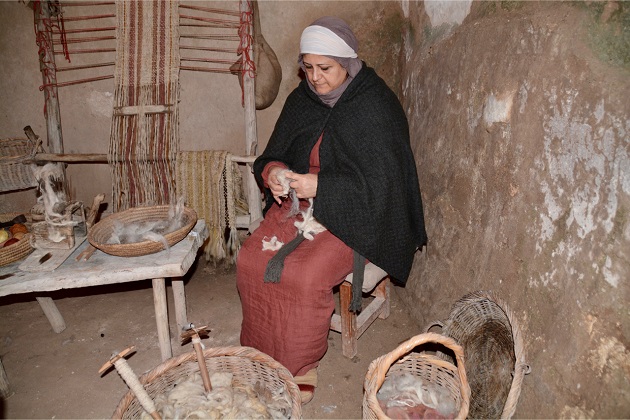Surrounded by cotton
There is only one verse in the Bible where cotton is mentioned (Esther 1 v 6), although many versions translate it as linen.
03 FEBRUARY 2018 · 17:00 CET

And when these days were completed, the king gave for all the people present in Susa the citadel, both great and small, a feast lasting for seven days in the court of the garden of the king's palace. 6 There were white cotton curtains and violet hangings fastened with cords of fine linen and purple to silver rods[a] and marble pillars, and also couches of gold and silver on a mosaic pavement of porphyry, marble, mother-of-pearl, and precious stones.
Esther 1:5-6 (English Standard Version)
The cotton plant (Gossypium herbaceum), which has its origin in Asia, can reach a height of one metre. It has large leaves with palm-like ribbing, the lower ones divided into five sections and the upper ones into three. The flowers appear one by one in the axils of the leaves.
The petals are yellow with a purple stain at their base. The fruit is an egg-shaped capsule which can be up to 6 centimetres in length and is divided into three cavities containing large seeds covered with numerous long white hairs, the cotton.
The filaments of the seeds are 95% pure cellulose and are capable of quickly absorbing large amounts of water (hydrophile). Hence their traditional application in medicine and surgery.
There is only one verse in the Bible where cotton is mentioned (Esther 1 v 6), although most of the versions translate it as linen. One of the few versions where it is translated correctly is the New Living Translation. In fact, the Hebrew word karpás derives from the Sanskrit word karpas, which, like the Greek term kárpasos and the Latin carbasus mean cotton.
In India, this plant is still known as karpas. It may well have been Alexander the Great who brought it to Greece and from there to Rome. From the Egyptian hieroglyphs it is known that cotton was grown on the banks of the Nile and was used to make cloth. The Arabs disseminated it throughout the Mediterranean region, and gave it the name kutun, from which the Spanish term alkutun was derived, and the English cotton.
The Persian king who appears in Esther by the name Ahasuerus (1:1-9) is known by historians by the Greek name Xerxes. His kingdom would now stretch from Pakistan as far as the north of present-day Sudan. In Susa, the ancient capital of the Persian empire, his father Darius I had begun to build a luxurious and extravagant palace which, Ahasuerus later completed at the beginning of his reign.
Even though this place was later sacked by the troops of Alexander the Great, and other military forces, archaeologists have found this complex and identified its characteristic features. In every detail this complex coincided with how it is described in the Bible. It is believed that a banquet like the one described in Esther took place in the year 483 BC, and the main reason for it was to persuade the other heads of state and military advisors to declare war against Greece. The white colour of cotton, and the blue of the hanging canvas were the royal colours of Persia. In this way king Ahasuerus displayed his enormous wealth, in order to show everyone present that he was the most powerful head of state in that part of the world.
This story serves, among other things, to show what greatness consisted in, from the human point of view, and also what it is from God’s point of view. Men are considered great when they possess great wealth, like that of king Ahasuerus, or when they feel powerful enough to compete with other ‘empires’ and think that they are wiser than everyone else.
However, from Jesus’s point of view human greatness lies in very different qualities. The truly great are those who serve others (Matthew 20:27); those who live humbly (Matthew 8:20); who wash the feet of their brothers (John 13: 1-16); or those who give up their lives for others (1 Timothy 2:6). According to the Master, one is only great when one loves one’s neighbour and forget about ourselves in doing God’s will.
Published in: Evangelical Focus - Zoe - Surrounded by cotton
